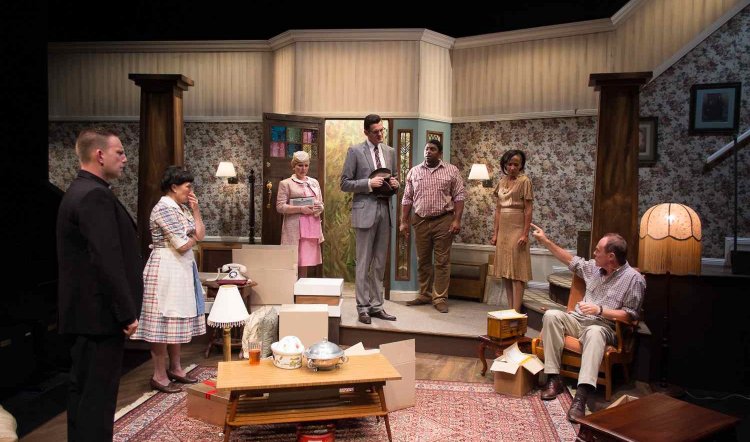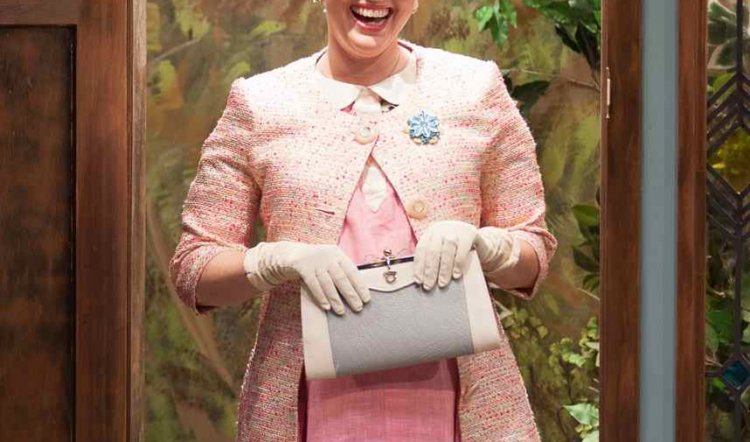
CLYBOURNE PARK
CLYBOURNE PARK, Ensemble Theatre, 13 March-19 April (SOLD OUT); extra performances at The Concourse, Chatswood, April 23-24 2014. Photography by Clare Hawley, l-r Thomas Campbell, Wendy Strehlow, Briallen Clarke, Nathan Lovejoy, Cleave Williams, Paula Arundell and Richard Sydenham; right: Briallen Clarke.
Bruce Norris is an American actor-playwright who struck drama gold with Clybourne Park. It was taken up by Chicago's Steppenwolf company and went on to win the 2011 Pulitzer Prize, the 2012 Tony Award for Best Play in the US and the 2011 Olivier Award for Best New Play and the 2010 Evening Standard Award in London. The rights were snapped up by the Ensemble and the Australian premiere production officially opened on March 19 with "sold out" signs already slapped across the entire season (extra performances now booked in for the lovely Concourse Theatre at Chatswood if you were slow off the mark).
Why has the Ensemble's audience rushed to this particular play? Co-artistic director Sandra Bates reckons an Ensembler loves new work, loves to know what's happening in New York and London and is attracted by the major gongs. In which case Clybourne Park ticks all boxes, but nevertheless is not a shoe-in for the Sandy Stone Nice Night's Entertainment Award. It's far tougher and more grown up than that - and way more rewarding.
It will matter not to most Australian theatre-goers but is interesting and important to know that Norris has taken inspiration from a much-loved American play - and subsequent movie - A Raisin In The Sun. (The title is a line in Langston Hughes' poem Harlem: "What happened to a dream deferred? Does it dry up like a raisin in the sun?") That play was about what happened to an African-American family whose move to a previously all-White area was blocked as far as the law courts by outraged neighbours. It was written by the then 29-year-old Lorraine Hansberry and based on her own family's experience in 1940s suburban Chicago. It was the first play by a black woman to be produced on Broadway and the play has been part of American theatre and race politics ever since. She died of pancreatic cancer at just 34 - Nina Simone's song Young, Gifted and Black was about her.
Bruce Norris has taken the situation of Hansberry's play and its time - 1959 - and placed it in a house in a nice white neighbourhood: 406 Clybourne Street. There, Karl (Nathan Lovejoy) who is also a character in Hansberry's play, is trying to do what he did in A Raisin In The Sun: prevent a black family moving in. The theme of polite racism is paralleled by another of equally polite intolerance.
The owners of No. 406 are Russ (Richard Sydneham) and Bev (Wendy Strehlow). Russ is almost catatonic with anger and grief. Their son, a veteran of the Korean war, committed suicide two years before - hence the grief. But Russ's anger is generated by their neighbours' attitudes in shunning the young man because, surprise surprise, My Lai massacre-type actions happened long before Vietnam. No wonder that nasty Korean campaign was later whitewashed for TV by the merry bowdlerising of M*A*S*H.
Daffy, well-meaning Bev is trying to cope with her almost-incapacitated husband while packing up the house and unwittingly patronising her maid Francine (Paula Arundell). Francine simply wants to leave work on time and doesn't want the damn silver chafing dish her employer keeps pressing upon her. Jim (Thomas Campbell) the local preacher arrives to offer his brand of succour and is closely followed by Karl and his profoundly deaf and very pregnant wife Betsy (Briallen Clarke). In the nicest possible way Karl wants Russ to stop the sale of the house to the black family - the Youngers - which makes this a virtual prequel to A Raisin In The Sun's because they were Lorraine Hansberry's protagonists!
When Francine's husband Albert (Cleave Williams) arrives to pick her up he completes a group of people all desperately trying to be nice to one another and avoid the social and political elephants in the room. It is excruciating and frequently funny - the satire is intense and Nathan Lovejoy's approximately 198cms of loose-limbed physical and internal misery are breathtaking to watch.

The second act of Clybourne Park is set in 2009 - a half century later - when the social consequences of that earlier event have come full circle and a white couple, Lindsey and Steve (Lovejoy and Clarke), is attempting to move in to what has become a predominantly black area. Fragile social niceties are set rattling once more as they and their lawyer Kathy (Wendy Strehlow in power mode) tread all over sensitive toes. They are opposed by a local resident Lena (Paula Arundell again) whose sensibilities are mightily offended by their plans for a huge MacMansion, not least because she values the area's history and, by the by, she is related to Francine and Albert.
Looming over the two disparate groups and times is the ghost of the young man whose death was the catalyst of the all the changes. Never seen but omnipresent in the grief of his father and his mother's heartrending naivety. "I really believe things are about to change for the better," she says to him on finding him, in the middle of his last night, writing a letter that links both moments in this microcosm of recent history.
Then again, looming over all is the knowledge that in profound ways, racial attitudes are much the same 50 years on as they were in 1959. And rather than proving otherwise, an African-American president has stirred virulent racism to the surface and it is as ridiculously polite and politically correct as so acutely portrayed by Norris.
Directed by Tanya Goldberg, the cast is powerful and true in their understanding of who they are and what they're doing. The costumes are well observed and executed - from stitched up, class-conscious 1959 to casual, seemingly democratic 2009 - are an achievement for young designer Tobhiyah Stone Feller. With lighting designer Verity Hampson she has effectively conjured up a simple but detailed 1950s suburban living room and front porch; both are as trashed and sad in the second act as Langston Hughes' unwilling prophesy of dreams deferred come true.
Clybourne Park is a tremendous play - intricate, beautifully realised; each character interlinked with his and her past and present and given every reason and tool to make the journey. It's a story that happens in Chicago but is also happening all over Sydney - with different races and cultures. And there are no easy answers, although much of it is acidly funny in a "be careful what you wish for" way. It makes for two hours of absorbing entertainment and those who've already bought their tickets are in for a terrific night's theatre.



